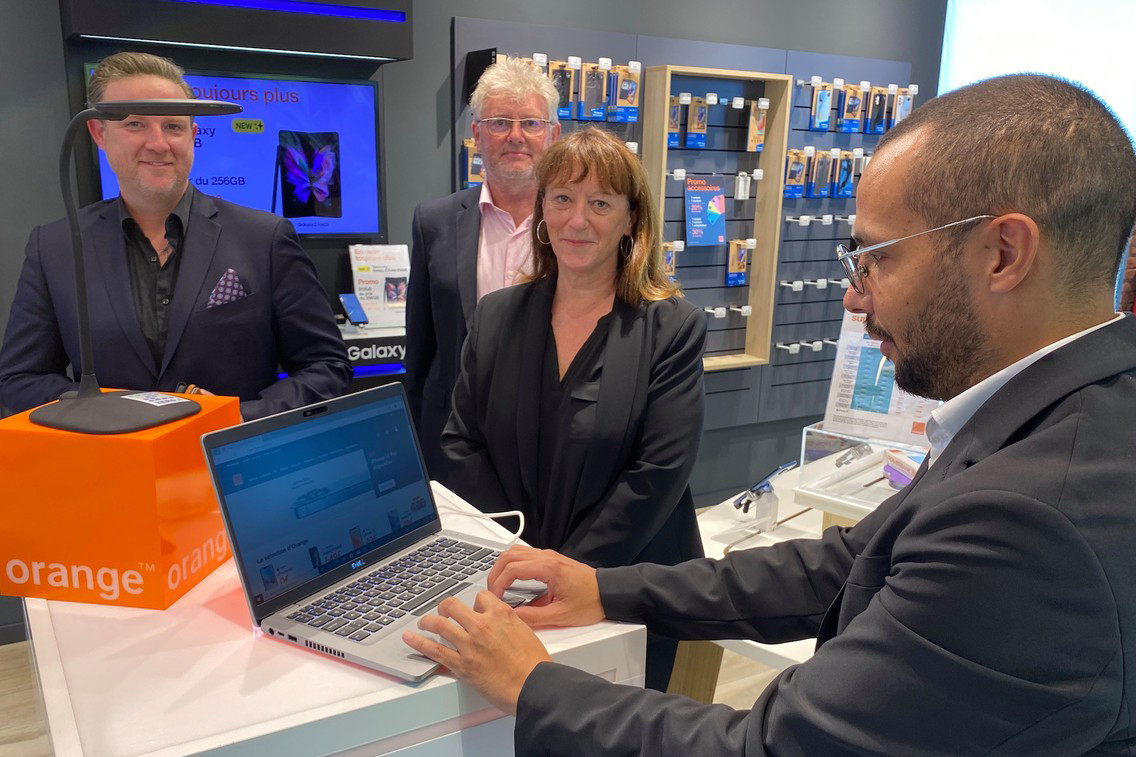A laptop sits on a white platform under a circle of pink and white neon lights. Orange wants to promote its light connection technology and wants it to be seen. In reality, the small black boxes that "do the work" are located under the ceiling and are almost invisible to the customer entering the recently opened store in the Kirchberg shopping centre, on the first floor, opposite Auchan.
“This technology has many advantages over wifi,” explains Micheline Perrufel, director of innovation, marketing and technology at Orange Labs, who came specially from Rennes for the opening of this shop on Monday evening and the conference organised by the government on the future of technology, from Tuesday to Thursday at Luxexpo. “It offers high-speed connectivity in both directions, downstream like wifi, but also upstream. The signal is more secure because it is more restricted. Latency is also improved. The technology is secure, otherwise our 28 cyber security centres around the world wouldn't want it.”
And, as the icing on the anti-5G cake, it has no negative impact on health as it does not emit any waves. After Air France, which decided to equip 14 A320s with this technology with the help of on-board servers to offer connectivity to its passengers, the operator will start marketing this technology “as a complement to everything we do,” says Perrufel.
Small boxes for light bulbs
Like Elon Musk, who has started to sell his connectivity from the sky with Starlink for €500 for a box and €100 per month for services, Orange estimates that individual equipment for this technology will cost between €400 and €500. The installation mainly involves small boxes between the fibre optic inlet of a house and the outside wall and other small boxes above the lamps that will serve as relays. Orange Luxembourg's commercial director Mustapha Rahem is the one to demonstrate: the laptop is connected at speeds that gamers and others addicted to a flawless connection will love.
Orange is also showing another technology, in collaboration with the Luxembourg start-up Zero.1: optical communication via camera. As Covid is obliged to do, we have become accustomed to using the camera of our smartphone to read the QR code on the card, especially in restaurants. The device presented in the shop only allows a top-down format, broadcasting information through a lamp. The user can pass his smartphone under the lamp, explains Jean-François Bourgeais, business analyst at Orange, and he has access to the information that we want to give him. A French school canteen uses it so that parents can find out what is on the menu for their children. Others have installed it in museums. Instead of the traditional devices that are rented at the reception desk, visitors can discover the history of a work or collection by passing their smartphone, in exactly the same way, under a kind of lamp. This is unlike "beacons", which would send a message to the smartphone of anyone passing by a shop, promising a 10% or 20% discount if they buy a product within 15 minutes. The user has to want to access the information to get it.
“These technologies are less intrusive and less harmful than others,” says Marc Fleschen, CEO of Zero.1, “but like many technologies, they will need the support of users to become widespread.”
Orange assures us, even though the store was not yet open as of Monday afternoon: setting up shop in the heart of a business district is a good opportunity to extol the merits of this technology, which can also be easily deployed in offices. Hearing about it is good. To be able to 'see' it working is better, says Rahem.
This article on Paperjam. It has been translated and edited for Delano.
